Exiled Chinese artist Ai Weiwei: 'Censorship in West exactly the same as Mao's China'
Summary
TLDRIn this gripping interview, the renowned Chinese artist Ai Weiwei draws striking parallels between the censorship he faced growing up during the Cultural Revolution and the curtailment of free speech he observes in the West today. Recounting his personal struggles, including imprisonment and physical abuse for voicing dissent, Ai Weiwei passionately advocates for artists' responsibility to represent human emotions and defend humanity. He critiques artists who prioritize profit over truth, asserting that true art demands freedom of expression. The interview also touches upon China's stance on Taiwan, with Ai Weiwei suggesting Beijing's determination to achieve unity, even through forceful means if necessary.
Takeaways
- 😷 The artist expressed concerns about censorship and the lack of freedom of expression in the West, which he compared to the censorship he experienced during China's Cultural Revolution.
- 🎨 He believes that many artists have been corrupted by capitalism and no longer prioritize representing human emotions or defending humanity through their art.
- 💰 He suggests that artists who sell their works for high prices may be tempted to silence their voices or refrain from expressing certain views.
- 🗣️ The artist believes he has a responsibility to speak out, despite facing imprisonment, beatings, and brain injuries for his activism.
- 🇨🇳 He symbolically portrayed his interrogator as bearing the face of President Xi Jinping, representing the power of the Chinese government questioning his artistic expression.
- 🇹🇼 He believes that Taiwan is effectively independent, despite China's claims over the island and its willingness to use any means necessary to achieve unity.
- ✊ The artist has no regrets about defending the values that benefit everyone, despite the personal consequences he has faced.
- 🚫 He does not think he could ever return to China and freely practice his art or exercise his rights.
- 🤐 The artist believes that in the West, people are being fired or censored for expressing even private opinions, which he considers a culture of destruction similar to the Cultural Revolution.
- 🌍 He argues that artists should represent human emotions and defend humanity, but most artists in society are more interested in money and fame.
Q & A
Why was the artist's exhibition in a London Gallery canceled?
-The artist believes the cancellation was due to their vocal support and recent tweet about the war in Gaza, although the gallery claimed it was not because of the topic discussed.
What does the artist say about society's reaction to opinions and arguments?
-The artist feels society has become timid and avoids questioning or arguing, leading to censorship and punishment of individuals for expressing basic opinions.
Is the artist concerned about freedom of expression in the West?
-Yes, the artist is worried that the West is starting to clamp down on freedom of expression for artists, writers, and intellectuals, similar to what they've experienced under political censorship.
How does the artist compare the current situation in the West to their father's experience during the Cultural Revolution?
-The artist compares the censorship and suppression of differing opinions in the West to their father's exile and punishment during the Cultural Revolution, suggesting a parallel in the intolerance for dissent.
What is the artist's view on the role of art and artists in society?
-The artist believes that art is a form of freedom of speech and that true art cannot exist without it. They criticize artists who prioritize fame and money over societal issues and truth.
Does the artist have any regrets about their activism?
-No, the artist does not regret their activism because they believe in defending values that benefit everyone, despite personal consequences.
What symbolic representation does the artist use to describe their interrogation by Chinese authorities?
-The artist uses a symbolic representation where their interrogator bears the face of President Xi, symbolizing the power and authority questioning their legitimacy as an artist.
Can the artist return to China and practice art freely?
-The artist believes they cannot return to China to exercise their rights or freely practice their art due to the prevailing conditions of censorship and control.
What is the artist's perspective on Taiwan's political status?
-The artist sees Taiwan as functionally independent and separate from China, despite the Chinese government's claim of sovereignty and the unresolved nature of their relationship.
What message does the artist convey about the importance of speaking out?
-The artist emphasizes the responsibility of individuals, especially artists, to defend humanity, express human emotions, and speak out against injustice, underscoring the importance of free expression.
Outlines

Esta sección está disponible solo para usuarios con suscripción. Por favor, mejora tu plan para acceder a esta parte.
Mejorar ahoraMindmap

Esta sección está disponible solo para usuarios con suscripción. Por favor, mejora tu plan para acceder a esta parte.
Mejorar ahoraKeywords

Esta sección está disponible solo para usuarios con suscripción. Por favor, mejora tu plan para acceder a esta parte.
Mejorar ahoraHighlights

Esta sección está disponible solo para usuarios con suscripción. Por favor, mejora tu plan para acceder a esta parte.
Mejorar ahoraTranscripts

Esta sección está disponible solo para usuarios con suscripción. Por favor, mejora tu plan para acceder a esta parte.
Mejorar ahoraVer Más Videos Relacionados

Dr K Interviewed On The Piers Morgan Show About The 'Chinese Incident'

UNESCO Talks: Interview with 2024 Nobel laureate Professor Daron Acemoglu

Jaipongan: Sejarah dan Gerak Dasar

“The Working Class in England" (Friedrich Engels 1845) Explained!

Salman Rushdie fatwa: 30 years on - BBC Newsnight

Financial Crisis 2.0: Scary Similarities Between 2007 (Pre Financial Crisis) & 2025 Charts And Data
5.0 / 5 (0 votes)
